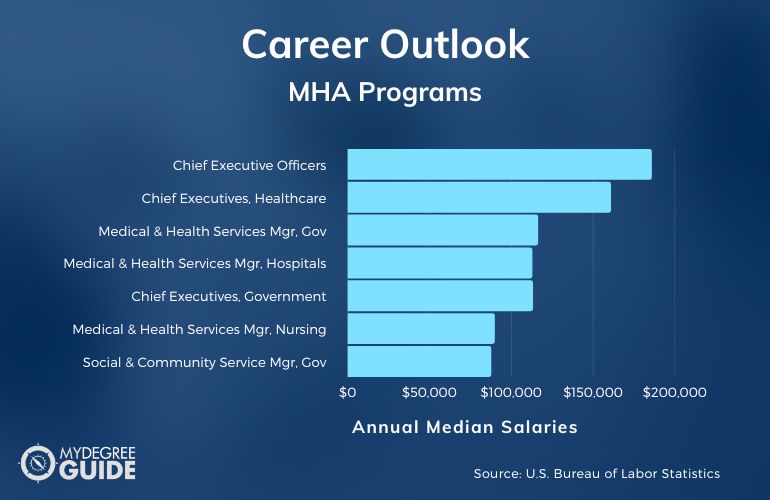Part time MHA programs, whether taken online or on campus, may set you up for a rewarding career in healthcare leadership.

A masters in health administration may qualify you for a broad range of career options that come with higher than average annual salaries and promising career growth. These may include top executive positions, health service managers, and community college instructors.
Editorial Listing ShortCode:
If you’re interested in healthcare and how places like hospitals, senior living facilities, or health clinics are managed, then you may want to consider a career in health administration.
Part Time MHA Programs

Earning a master degree in health administration may prepare you for a career in leadership and management in healthcare.
Pursuing your MHA may allow you to develop advanced knowledge and skills in several areas of health leadership. This may include health information management, health informatics, organizational change, human resources management, and managing interdisciplinary teams.
A career in this field may also require you to develop a comprehensive understanding of ethical decision making in healthcare settings, healthcare law, and financial management and budgeting.
Concentrations in MHA programs may include health informatics, organizational development and leadership in healthcare, health policy, gerontology, and education.
Editorial Listing ShortCode:
Positions that you may qualify for with your degree could include chief executive officer, chief operating officer, health services manager, social and community service manager, and long-term care administrator. Other positions may include health management consultant, health policy advisor, or community college instructor.
These roles may exist in several different environments. You may find work in hospitals, health clinics, long-term care homes, senior living facilities, assisted living facilities for people with developmental disabilities, or mental health hospitals.
Your work may allow you to support nonprofits, government institutions, or private organizations. Some positions, such as health management consultant, may allow you to operate your own business and provide consultation services to hospitals and healthcare providers.
After earning your masters, if you would like to continue your education, you may be interested in one of the part time doctoral programs that some universities offer.
Part-Time vs. Full-Time MHA Programs

Part-time and full-time MHA programs offer a few key differences. Depending on your goals and needs, each may offer certain benefits and drawbacks for your situation.
Your decision to attend either part-time or full-time may also affect the financial aspect of your degree and the length of time required to complete it.
Enrollment
Part-time MHA programs may be attended via online or on-campus study options. While on-campus options generally follow a traditional 15 week semester schedule, online healthcare administration degree programs may offer you alternative attendance structures.
In some cases, online master programs may offer monthly course enrollment into 5 week or 8 week courses. By enrolling in a program with reduced course lengths and continuing year-round, you may be able to complete your degree in less time than following a traditional semester schedule, even when attending on a part-time basis.
Time to Completion

A full-time masters program typically takes 1 to 2 years to complete. When attending part-time, it will often take longer. Whether you choose to attend a certain MHA program full-time or part-time, you will likely still be required to complete the same number of credits for each option.
The difference lies in the number of credits that you take each semester. A reduced course load will often extend the number of years required to complete all credits and obtain your degree.
The minimum part-time course load that you’re permitted to take can vary from school to school. For example, some schools or programs may allow you to take one course at a time while others may require you to take more in a given semester.
Pros and Cons
| Part-Time MHA | Full-Time MHA | |
| Pros |
|
|
| Cons |
|
|
MHA Careers & Salaries

With a Master of Health Administration, you may find rewarding positions related to your degree in a variety of settings. You may work in hospitals, health centers or clinics, mental health centers, or senior and assisted living facilities. You may also find positions in consulting firms, government institutions, or non-profit organizations.
Editorial Listing ShortCode:
According to the Bureau of Labor Statistics, part-time MHA degree programs may prepare you for a challenging career in healthcare leadership across various settings, including those listed below.
| Careers | Annual Median Salaries |
| Chief Executive Officers | $185,950 |
| Chief Executives, Healthcare and Social Assistance | $160,950 |
| Medical and Health Services Managers, Government | $116,380 |
| Medical and Health Services Managers, Hospitals | $112,870 |
| Chief Executives, Government | $113,270 |
| Medical and Health Services Managers, Nursing and Residential Care Facilities | $89,880 |
| Social and Community Service Managers, Government | $87,720 |
| Postsecondary Teachers | $80,790 |
| Social and Community Service Managers, Nursing and Residential Care Facilities | $63,340 |
| Social and Community Service Managers, Community and Vocational Rehabilitation | $61,450 |
The Bureau of Labor Statistics predicts significant job growth across the various leadership positions in healthcare. These growing positions include top executives (4% job growth), postsecondary teachers (9%), social and community service managers (17%), and medical and health services managers (32%).
Health Administration Master’s Curriculum

Course curricula in masters in health administration programs are intended to provide you with an advanced level of competency across a broad scope of leadership topics as they apply to healthcare settings specifically.
- Health Administration: This course covers principles of leadership in healthcare settings, including theories of organizational behavior and quality improvement.
- Healthcare Law: This course is a review of legal considerations in healthcare, including medical ethics and risk.
- Financial Management: This course covers best practices in financial management and budgeting within various healthcare settings.
- Ethical Decision Making: You’ll learn about ethical issues specific to health and care, including end of life care, consent, and access to care.
- Healthcare Informatics: This course deals with practices relating to the management and use of IT resources and systems in health care.
- Community Health: You’ll review various determinants of health, including cause, risk, and outbreak investigation.
- Health Information Management Systems: This course covers applications used in the delivery of patient care and management of patient health data.
- Records Management: You’ll explore standards in patient record management using computer-based systems.
- Organizational Leadership: This course covers foundations of leadership and management in healthcare settings, including oversight of interdisciplinary teams and professional development.
- Managing Change: This course covers principles of managing organizational change, including systems thinking approach and acting as a change agent.
Other courses may include health policy, health service delivery, accounting for health service managers, and economics.
Admissions Requirements

Qualifiers for entry into a part-time MHA program may vary from one school to the next, but common requirements may include:
- Completion of a bachelor degree program
- A specific GPA from undergraduate studies
- GRE or GMAT scores, if required
- Letters of recommendation
Other requirements may include the submission of an online application, copies of all postsecondary education transcripts, and a letter of purpose.
Accreditation

Regional accreditation validates that an academic program has met a predetermined set of quality standards.
Attending an accredited program is an important consideration if you’re interested in transferring credits down the road. It is also an important factor to consider if you’re planning to apply to a doctoral program at some point in your academic journey.
Editorial Listing ShortCode:
Employers also tend to look more favorably upon programs that were completed at an accredited institution. You can find out if the program you’re interested in attending is accredited via the U.S. Department of Education‘s website.
Financial Aid and Scholarships

There are a number of financial aid opportunities available to qualifying students that may help you fund your part-time master’s in health administration. These financial aid options include federal aid, state aid, and scholarships.
Federal and state aid programs generally offer funding as grants or loans to qualifying students. Scholarships may be offered by public or private organizations and do not require repayment.
In some cases, employers may offer funding for staff who attend a graduate program through a professional development or employee training program. This is particularly applicable when the educational pursuit directly benefits the organization.
You can apply for financial aid opportunities via the Free Application for Federal Student Aid (FAFSA) on the U.S. Department of Education’s website.
What Can You Do with an MHA?

Attending an MHA program part-time may lead you to a variety of rewarding management and leadership positions in healthcare. You may work in hospitals, health clinics, nonprofit organizations, senior living facilities, or long-term care homes.
Positions that you may qualify for could include medical and health services manager, social and community service manager, and top executive positions. Other roles may include long-term care administrator, health management consultant, or health policy advisor.
How Long Does It Take to Get a Part Time MHA?

Depending on the school and program you choose to attend, obtaining your master’s in health administration may require you to complete anywhere from 30 to 60 credits. A full-time masters program typically takes 1 to 2 years to complete.
Both part-time and full-time MHA programs require the same number of credits to be completed. So, you can expect that enrolling on a part-time basis may extend the length of time it will take for you to complete your degree. This is the case for part time programs in general, including part time MBAs or part time MPA programs.
Whether you attend your program online or on campus is another factor that can impact the length of time required to graduate.
A number of online MHA programs may offer 5 week or 8 week courses instead of the traditional 15 weeks. Some programs also offer monthly enrollment. As a result, you may be able to complete a part-time online program faster than a part-time on campus alternative.
What Is an MHA in the Medical Field?

In the medical field, an MHA is an educational pathway that may set you apart from other medical professionals. You may gain advanced leadership and managerial skills from your program.
A part-time MHA program teaches leadership practices related to financial management, personnel management, information management, and patient safety. These courses help prepare students for high-level executive roles in healthcare settings.
Editorial Listing ShortCode:
The emphasis within an M.H.A. program is less focused on patient care and hands-on practices and is instead more focused on management principles and business operations.
What Is the Difference Between an MHA vs. MBA?

While MBA and MHA programs both provide students with a breadth of information on business practices and leadership principles, there are key differences between the two programs.
Masters in Business Administration:
- Advanced study of business leadership
- Broad and general focus of business and leadership
Masters in Health Administration:
- Advanced study of leadership and management in healthcare settings
- Educational content is geared towards healthcare
Generally speaking, an MHA is geared towards students who know that they want a career in healthcare leadership.
It’s worth noting that a growing number of universities offer MBA / MHA dual degree programs for students wishing to earn a graduate degree in both fields.
What’s the Difference Between an MPH vs. MHA?

MPH and MHA programs are both related to healthcare, but there are differences that set these areas of study apart.
Masters in Health Administration:
- Focus on management and leadership in healthcare settings
- Curriculum is more geared toward business studies
Masters in Public Health:
- Focus on science and research of public health issues
- Curriculum covers epidemiology, biostatistics, and social determinants of health
Another difference between MPH and MHA programs is that MHA degrees are intended for individuals who want to step into leadership positions in healthcare. MPH programs are intended for those who want to be more heavily involved in research.
Is an MHA Degree Worth It?

Yes, a master’s degree in health administration is worth it for many students. Jobs in In the management sector are projected to grow at a rate of 5% in the next 10 years (Bureau of Labor Statistics), faster than the average for all occupations.
Common health administration careers in this sector include long-term care administrator, top executive, medical and health services manager, health management consultant, and social and community services manager.
Universities Offering Part-Time Masters of Health Administration Degree Programs
Methodology: The following school list is in alphabetical order. To be included, a college or university must be regionally accredited and offer part time degree programs.

Cornell University offers an Executive Master of Health Administration program that allows students to learn in a virtual format while still allowing them to gain valuable face time from their instructors.
This degree program can be completed in 18 months and connects students with industry-leading professionals. An MHA from CU prepares students for the unique challenges facing the healthcare profession.
Cornell University is accredited by the Middle States Commission on Higher Education.

The MHA at George Washington University was created for industry specialists who are pursuing leadership roles in healthcare. Students enrolled in this program are connected with staff, students, and alumni to form cohorts of support professionals to assist in their educational journey. This program can be completed in as few as 2 years.
GWU also offers part time MPP programs for students interested in public policy as a career.
George Washington University is accredited by the Middle States Commission on Higher Education.

At Grand Valley State University, students can complete their MHA with 48 credit hours in a hybrid learning environment. This curriculum trains students in all aspects of managerial responsibilities found in the healthcare industry. The program combines core classes with areas of specialty for students to personalize their learning options.
Grand Valley is accredited by the Higher Learning Commission.

New York University’s Master of Health Administration is an online interactive program that allows students to gain the knowledge and practice needed to advance their healthcare careers. Students at NYU are taught by experts in the industry that help mentor and guide students in their learning experiences.
New York University is accredited by the Middle States Commission on Higher Education.

Working professionals turn to Ohio University to get the education they need to advance in the healthcare field. Students enrolled in OU’s MHA seek a better understanding of the business of healthcare and work to gain the leadership skills they need to succeed in this field.
Ohio University is accredited by the Higher Learning Commission.

Queens University of Charlotte offers an MHA that can be completed online and is an affordable option for today’s busy professionals. This program requires 36 credits and can be finished in as little as 2 years. QUC’s MHA takes a hands-on approach to teaching, engaging students in a rigorous curriculum that helps them become leaders in their field.
The Queens University of Charlotte is accredited by the Southern Association of Colleges and Schools Commission on Colleges.

The Master of Health Administration offered by Southern Illinois University is intended for students interested in managerial positions in healthcare facilities, government agencies, and other providers. This online program is rich in methodology and research that equips students in their professional area. The MHA at SIU can be completed in as little as 2 years.
SIU is accredited by the Higher Learning Commission.

The University of Louisville’s online Master of Science in Health Administration was created for experienced healthcare professionals looking to advance their careers. This program develops current knowledge and creates a better understanding of the leadership side of the industry.
U of L’s MHA is data-driven and strategy-based and teaches students to solve industry-focused problems.
The University of Louisville is accredited by the Southern Association of Colleges and Schools Commission on Colleges.

With a Master of Health Administration from the University of Phoenix, learners can develop the skills needed to move up in their profession. Each online course at UOPX is 6 weeks long and designed for the working professional. Students in the program develop leadership knowledge in all areas of healthcare.
University of Phoenix is regionally accredited by the Higher Learning Commission.

The University of Washington understands that healthcare is a growing industry that’s constantly changing. That is why its MHA helps students gain the necessary skills and knowledge to compete in this field. Students graduating from UW’s MHA program have learned how to effectively lead in all areas of the healthcare industry.
The University of Washington is accredited by the Northwest Commission on Colleges and Universities.
Getting Your Part Time MHA Online

Earning your masters in healthcare administration may provide you with the needed qualifications to branch into rewarding and challenging leadership roles in healthcare.
You may have the opportunity to develop a versatile career that allows you to work in a number of different environments, including hospitals, health clinics, nonprofits, senior living facilities, or long-term care homes.
With above average annual salaries and a positive job outlook for healthcare leaders, earning your MHA may prove to have an excellent return on investment. If you’re interested in advancing your career in this field, you can start by exploring part-time, online MHA programs from accredited universities.

